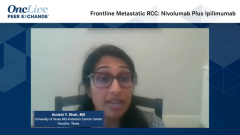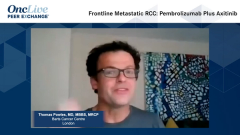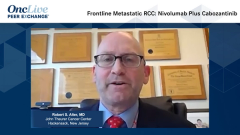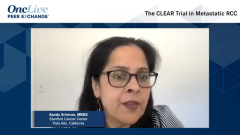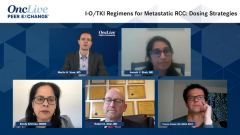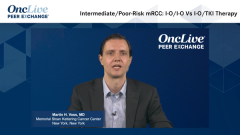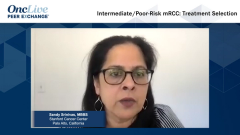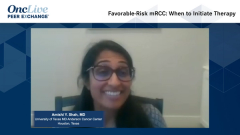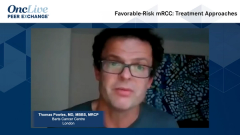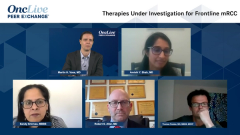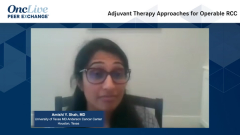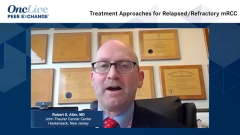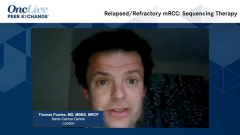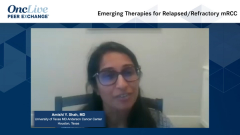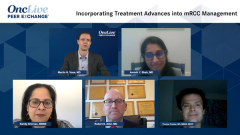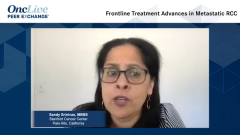
Adjuvant Therapy Approaches for Operable RCC
A summary of current therapies and ongoing investigations of adjuvant therapy for patients with operable renal cell carcinoma.
Episodes in this series

Martin H. Voss, MD: I want to change to a completely different topic that got a lot of attention during this year’s ASCO [American Society of Clinical Oncology] Annual Meeting because it was featured at the plenary session: the adjuvant space in nonmetastatic patients who have undergone nephrectomy for locally advanced disease. The audience knows well that we’ve had approval for 1 TKI [tyrosine kinase inhibitor] in that space and a host of negative trials in that mechanism of action. We’ll speak to that very briefly, and then I want to focus us a little on the recent adjuvant immuno-oncology data. Amishi, can you summarize the TKI data that has accumulated through the years? Without going into these trials in too much detail, there’s a certain theme that has come through.
Amishi Y. Shah, MD: Absolutely. In brief, as we see most disease states, if we see therapy with activity or benefit in the metastatic setting, our question is: Do we bring this therapy earlier and therefore improve our cure fraction or our control of the disease? Therefore, can we add therapy onto patients getting nephrectomy for localized disease, prevent recurrence, and improve long-term survival? The audience definitely is familiar with the many adjuvant targeted therapy trials that have happened, several of which had negative results. For example, the ASSURE trial did not meet its primary end point of disease-free survival with adjuvant sunitinib or sorafenib compared with placebo.
The 1 approval we do have in this space is on the basis of the S-TRAC trial with sunitinib showing an improvement in disease-free survival of 6.8 years compared with 5.6 years in the control arm. The big caveat that we’ve always discussed with this trial is there was a high rate of toxicity with sunitinib and no overall survival [OS] benefit to date. Putting the targeted therapy adjuvant trials aside, the rule of I/O [immuno-oncology] therapy may be very different. We know I/O–based therapy improves overall survival in the metastatic setting. For a fraction of patients, it puts them in this long-term prolonged response that we’ve touched on quite a bit. Perhaps with early immune modulation perioperatively, we can truly reduce the risk of recurrence and improve long-term survival. That was the basis of the theory behind this adjuvant trial that we’ll discuss.
Martin H. Voss, MD: Terrific. There are a number of adjuvant immuno-oncology–based trials that have been initiated. Several have fully accrued at this point. The first to have been presented was presented by Dr Ashutosh Tewari at the plenary session this year. Dr Powles was an investigator and is an author on that abstract also. Tom, maybe you can provide an overview of your findings that were presented at ASCO just a few weeks ago.
Thomas Powles, MD, MBBS, MRCP: No. 564 is tattooed on my brain now. It’s a number I find myself using in almost every conversation. The reason why is that [KEYNOTE-564] is an important and very provocative piece of work. It’s a randomized phase 3 trial of patients with high-risk clear cell kidney cancer. It incidentally also includes a subpopulation of M1 NED [no evidence of disease]: patients who have had surgery from a small number of metastatic sites. That comprised only 6% of the population. This is 1:1 randomization, double-blind, placebo-controlled, with DFS [disease-free survival] as the primary end point. It hit its primary end point with 2 years of follow-up.
Martin H. Voss, MD: How long were patients treated, Tom?
Thomas Powles, MD, MBBS, MRCP: One year of therapy, so 17 cycles. The hazard ratio was 0.68 for DFS. The curve goes apart quite quickly and stays apart. There’s a lot of heavy censoring at the end of the curve. We need to see more DFS follow-up there. The subset analysis was broadly favoring the pembrolizumab across the board. Provocatively, there was an OS signal as well, which came in at 0.54, but with very few events at this particular time point and not statistically significant.
The grade 3 to 5 treatment-related adverse events was about 20% associated with pembrolizumab. The discontinuation rate of pembrolizumab was 20%, with 7% of patients requiring high-dose steroids. This is the first immunotherapy study with DFS advantage. It’s got a trend toward OS. It appears tolerable. There are some questions we need to address. No. 1 is we need to see an OS signal, of course. It’s premature for that, but as things stand, things tend to be pointing in the right direction. It would be nice to see quality-of-life data to support the tolerability of the drug. It’s important that there were no treatment-related toxic deaths. There were some deaths in the control arm, but it doesn’t look like they were treatment-related. Overall, the safety profile looks good.
It would be terrific to identify biomarkers associated with this population. In other cancers, we’re making more progress than we are in kidney cancer. Clearly, we’re overtreating 50% of the population who are never going to relapse because of successful surgery. It would be terrific to identify that group. This trial potentially has the ability to do that as well. As I see it, it’s really important data. The OS signal is important because it’s premature but trending the right way. The tolerability is good. There are lots of questions that will be answered in the future.
Martin H. Voss, MD: I agree that it’s very exciting. It’s the first of several I/O-based adjuvant studies that are reading out. Sandy, maybe you can speak a little to the others that are coming our way. There are interesting phase 3 trials in the adjuvant space. What are the ones you have your eyes on?
Sandy Srinivas, MBBS: Clearly, the PROSPER RCC trial is really important. It’s a cooperative group trial with a slightly different design in that patients in that study will get a dose of nivolumab prior to nephrectomy, and then following nephrectomy, they’ll get 1 year of nivolumab therapy vs observation. This is another slightly different design. There was placebo here vs observation. The other one is going all the way with ipilimumab-nivolumab in the adjuvant setting. We have a number of trials, but without question, it was really exciting to see immunotherapy come to the adjuvant space for the first time. There will be a group of the patient population who will definitely derive benefit from this.
Transcript Edited for Clarity


